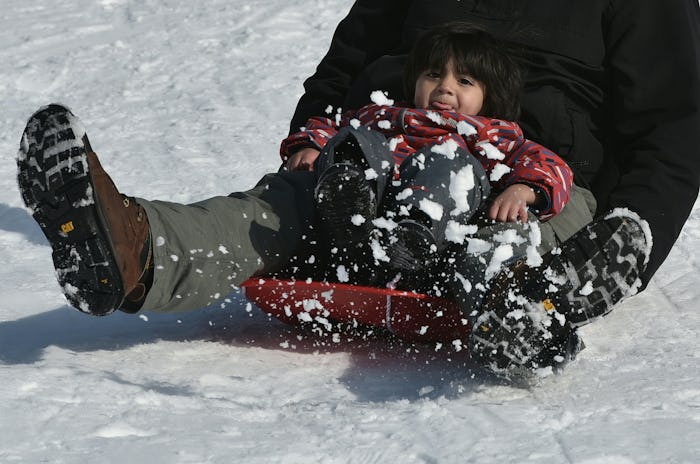
How Fast Does Frostbite Affect Kids? It Depends On The Situation
Everyone knows that kids don't stop playing outside just because it's cold. In fact, they seem to like it even more. But playing outdoors in the winter comes with its own dangers and it's good to know how fast frostbite affects kids, so when they come in and have lost their gloves, you can react appropriately.
Frostbite is just damage to nerve tissue on the skin and it normally affects the hands and feet — specifically fingers and toes, which is why bundling up in warm socks and gloves is the first defense against it. Frostbite affects kids much more quickly than it does adults, so although you might be fine to ride your bike for three hours in below freezing weather, your little friend might be hurting.
According to Kid's Health, frostbite affects kids quickly because their skin absorbs less heat. But also because they're simply unwilling to give up the snow-fort making and come inside for a bit to warm up now and again. If you're really stressing about frostbite, giving your kids a time limit to play outside in colder temperatures is a good way to ensure it doesn't happen.
According to the Mayo Clinic, the most common symptoms of frostbite are a "prickly feeling on the skin, numbness, red, white, bluish-white or grayish-yellow skin, hard or waxy-looking skin, clumsiness due to joint and muscle stiffness," or even blistering in the worst cases. You can take care of frostbite at home by soaking the affected skin in warm water. But really, it's best to wrap them up in dry and warm clothes, and call your doctor. While you wait for the doc, soak the affected area, but do not use direct heat like a heating pad and don't rub or massage the skin, according to Stanford Children's Health.
Usually, this will take care of the first stage of frostbite called "frostnip." But if the skin is getting redder after soaking, blistering, or has ice crystals form on it (seriously), you should go see a doctor immediately.
If your kid has deep frostbite and has super pale, numb skin with blisters, or experiences swelling in the area, it's an emergency. Sometimes patients might also have a fever. Severe frostbite can cause a serious injury, so you want to take care of it as quickly as possible.
If your child is slurring their speech or out of it, they could be experiencing hypothermia. Luckily, most frostbite is pretty mild (it's just the backyard, not like they're like trekking Beyond The Wall for months, right?) so it's nothing to worry about.
In the moment, the panic of frostbite is usually scarier than most of the affects of the injury. So stay calm — and bundle that kid up.